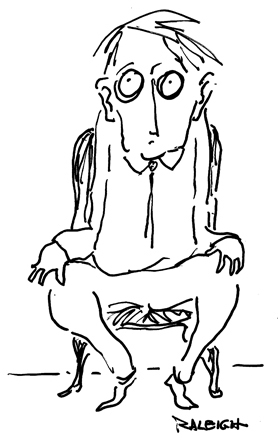Film:
Blink
By Henry P. Raleigh
ART TIMES online Dec 2010
 |
I recently came across a tribute to the film historian, David Bordwell. Mr. Bordwell is also known as a cinema writer, a title I will keep in mind along with cineast and film strategist as back-ups in case the title film critic should disappear entirely from the language along with its few remaining practioners . Mr. Bordwell is a teacher and runs an influential film blog and is author of several film books, one of these The Art of Film I had early on added to my own library. Now Mr. Bordwell is an advocate of cognitive film and has, it seems, a special interest in how our perception of film comes via the blinking of the actors. Eye blinking, he believes, is a good part of the expressive style of film. Filmmakers, he says, will even cut away from an actor’s face just before he or she blinks to avoid unwanted expressive meanings. I guess this must be done in the editing process for how could a director know when an actor is about to blink? I mean this couldn’t be signaled by a blink now could it? At any rate, Mr. Bordwell counts blinks and their associative meanings and I imagine this can be useful in viewing a film that otherwise appears meaningless.
I will admit that as sensitive as I am to the nuances of film the blinking of actors was not something to which I had paid any attention. Mr. Bordwell had noted that actors can be taught not to blink so is it possible that there had never been a single eye blink in any film I had seen? Of course, that couldn’t be true and it’s just that I was too busy blinking myself to grasp the meaning of on-film blinking. If you get into this thing it can prove disturbing, I can tell you. Ever since Mr. Bordwell pointed out the significance of blinking I’ve been unable to watch a film without obsessively trying to track the blinking, often missing the delivered lines of dialogue that may accompany the blink, or blinking, or not blinks as the case may be. Unhappily then, whatever I gain from one level of expression I am losing it at another. There is also the problem of the squint. Is a squint an anti-blink, does it cover up an actual blink? And tehre is, as well, the chance that I may blink at exactly the same time as the film actor blinks and I’ll therefore miss the count and the expressed meaning.
My obsession now with blinking has carried over to television. I’ve observed that news anchors blink a lot and what does that mean? Politicians on television hardly blink at all, some don’t even seem to be breathing. Would it be possible some day to judge the quality of a film by the number of blinks it contains. That would certainly give unemployed film critics something to do although it would be an exhausting task. To tell you the truth I’m sorry I ever heard about Mr. Bordwell’s idea.
